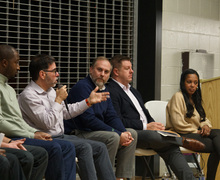Toner-winning reporters reflect on Election Day coverages that won them awards
Brittany Miller I Asst. News Editor
The winners of the 2022 Toner Prize talked to students at Newhouse on Tuesday evening.
To support student journalism and the content you love, become a member of The Daily Orange today.
David Wickert, a journalist at The Atlanta Journal-Constitution, said the award-winning multimedia news package that he worked on was published too early on accident by a staff designer.
Despite its accidental early release, the package, which focused on Georgia’s role in the 2020 United States Presidential Election, still received the 2022 Toner Prize for Excellence in Political Reporting, along with an article package from The Washington Post.
The prize – which Syracuse University’s Newhouse School of Public Communications awards annually – for the best U.S. national or political reporting in any medium, commended the two publications’ projects related to the 2020 presidential election.
Amy Gardner and Josh Dawsey of The Washington Post and David Wickert and Greg Bluestein of The Atlanta Journal-Constitution spoke with students about the processes behind their award-winning reporting at the “A Discussion with the 2022 Toner Prize Winners” event in the Joyce Hergenhan Auditorium on Tuesday evening.
Edecio Martinez, professor of practice in Broadcast and Digital Journalism, moderated the discussion. He explained that the prize is awarded for both national and local reporting, and is named after the late Robin Toner, an SU alumna. Bluestein expressed admiration for her as the first woman to hold the position of national correspondent for The New York Times.
Lauren Holdmeyer, a first-year broadcast and digital journalism student, said she took the event as an opportunity to reflect on her own political reporting.
“I worked on an election night package with CitrusTV last week, and I want to see if I could do political reporting in the future, so I came out to this event to see what the professionals are doing,” Holdmeyer said.
The award recognized Gardner and Dawsey for their investigative package titled “The Attack,” which explained the causes, cost and aftermath of the Jan. 6, 2021 attack on the U.S. Capitol building. Wickert and Bluestein were part of a seven-person team that created the multimedia package “Inside the Campaign to Undermine Georgia’s Election,” which focused on the period of time when Georgia held vital electoral college votes between the 2020 election and Jan. 6, 2021.
Both teams of reporters said they were pleased with the final results of their work despite obstacles along the way.
After the Journal-Constitution’s accidental early release of their story, Wickert said the team wasn’t sure how many people had seen the project before they caught it and took it down.
Dawsey and Gardner said the wide base of resources they had access to at The Washington Post was a significant help as they went about their reporting and publishing process.
“We were able to have a debugging session right before it was published,” Dawsey said. “This included having people out on their laptops, phones and iPads to see if the package worked in every medium and we had people at the ready to check every little detail.”
Gardner said the team at The Washington Post expanded to include non-political reporters, including some from the metro desk, who helped with the fact checking. Bluestein said the way he built his sources over the course of his years at the Journal-Constitution was a significant help to his fact-checking process.
“You work with these folks every single day and you’re building a rapport and reputation with them,” Bluestein said.
Gardner recalled instances of sources hanging up on her for even using the phrase “election deniers” during calls. She said the most successful method she had was to return to sources with an explanation how their quotes would be used in her stories.
All four reporters said the information they contributed to the public made the process of reporting on and releasing the Toner Prize-winning stories worth it.
“38,000 words later — and that’s almost the length of a novel — we gave readers a deeper understanding of what happened (on Jan. 6) and we’re pleased with what happened,” Dawsey said.
Students in attendance asked the reporters what skills they learned on the job that they couldn’t have learned in the classroom.
On the investigative reporting process itself, Gardner told students who attended the event that being thorough and persistent are essential in the pursuit of meaningful, cohesive and accurate stories.
“Investigative reporting really isn’t that hard if you’re willing to put the work in,” Gardner said. “It’s about calling 10 more people, finding something. It’s just about leaving no stone unturned, and if you do that, you will find good stories.”
To support student journalism and the content you love, become a member of The Daily Orange today.
Published on November 16, 2022 at 1:19 am





